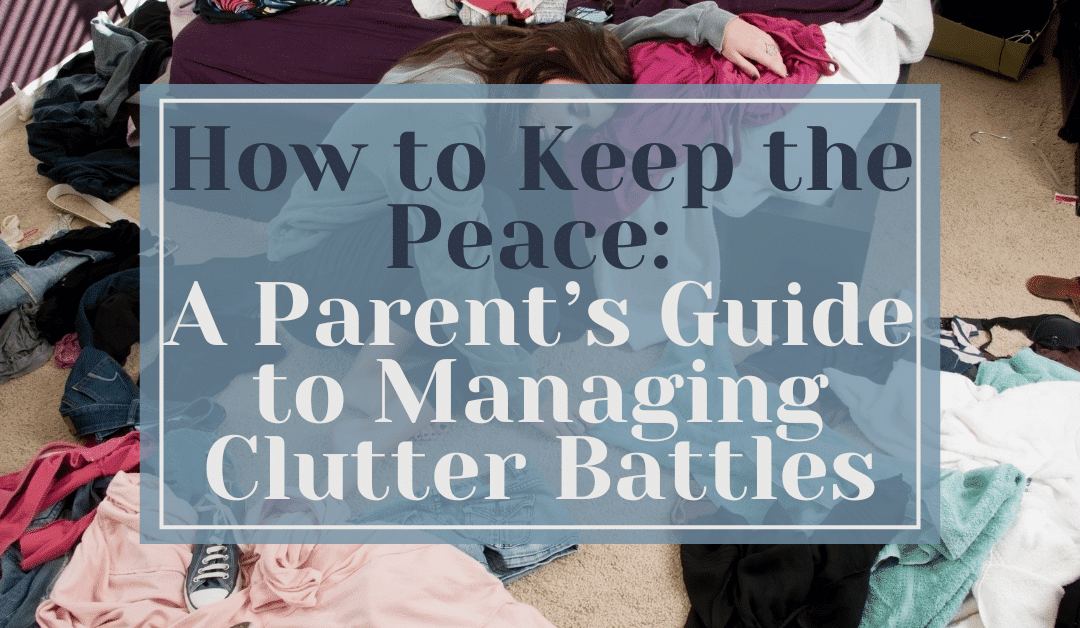As a parent, one of the most common struggles you’ll face during your teen’s adolescent years is dealing with their messy room. It’s easy to feel overwhelmed by the clutter and frustrated by the seeming lack of care. However, this battle doesn’t have to lead to constant conflict. In fact, with the right approach, you can navigate this challenge in a way that fosters mutual respect and understanding, keeping the peace while setting healthy boundaries.
As a parent of two teenagers myself, I know all too well the frustration that comes with a messy room—or worse, garbage, dishes, and random mess scattered around the house. It’s a constant challenge, but one that’s part of the package deal of raising teens. What I’ve learned over time is that it’s possible to manage the chaos while maintaining your sanity—and your relationship with your teens.
Understand the Teen’s Perspective
Before diving into cleaning rules, it’s important to step back and consider things from your teen’s point of view. As your child grows, their room becomes a deeply personal space. It’s not just a physical space, but a reflection of their individuality, creativity, and emerging sense of self. To many teens, a messy room can feel like an expression of their independence or a sign of control over their own world.
While it might seem like they’re simply being rebellious or careless, keep in mind that teens often don’t view clutter the same way adults do. Their priorities, mental focus, and energy may be directed elsewhere, leaving the room as an afterthought. By understanding this, you can approach the situation with more empathy and less frustration.
Focus on Open Communication
One of the most effective ways to tackle the messy room issue is through open and honest communication. Rather than jumping straight into “you need to clean your room” mode, engage in a calm discussion. Express how the mess makes you feel, but be sure to avoid sounding accusatory. Use “I” statements, such as, “I feel stressed when your room is messy because you can’t walk in it, and it becomes a safety hazard,” rather than saying, “You never clean your room.”
This approach sets the stage for a productive conversation where both sides feel heard and respected. You’ll be more likely to come to a solution that works for both you and your teen.
Collaborate on Expectations
It’s important to recognize that both you and your teen have different standards when it comes to cleanliness. A perfectly tidy room might not be what your teen considers a priority, and insisting on perfection could lead to unnecessary conflict. Instead of imposing your expectations, work together to set realistic guidelines.
Perhaps a completely pristine room isn’t necessary, but setting some boundaries, like “the bed should be made” or “the floor should be clear,” can strike a balance. By collaborating on what’s expected, your teen will feel like they have a say in the process, and you’re less likely to have a power struggle.
Make Cleaning a Team Effort
Instead of issuing demands or enforcing cleaning time alone, why not make cleaning a collaborative activity? Tackle the mess together. This can reduce the anxiety or dread that can come with cleaning a disorganized room, and it makes the experience more of a shared responsibility rather than a punishment.
You might even turn cleaning into a “party”—put on some music, set a timer for 15-minute bursts, and work side by side. The goal is to make cleaning feel less like a chore and more like an activity you’re doing together.
Set Practical Guidelines
Sometimes, it’s important to establish some consistency. Set aside specific days or times for cleaning, such as a weekly tidying session. By building regular habits into their schedule, teens will become more accustomed to the expectation that their room needs to stay relatively clean.
Consider using a reward system to motivate them. For example, if they keep their room tidy for the week, they could earn extra screen time, a favorite snack, or a privilege they enjoy. A positive reinforcement approach helps make the process more motivating for them.
Respect Their Space
As much as you’d like your teen’s room to be pristine, it’s equally important to respect their need for privacy and autonomy. Their room is their space to express themselves and to navigate their teenage years. While you can set expectations for cleanliness, don’t take it personally if their room doesn’t meet your standards.
Offer suggestions to help them maintain order, such as bins, drawers, or storage solutions that are easy for them to use. You can also give them the tools to manage their own space while still keeping some level of order. This balance will help them take more responsibility for their space without feeling like it’s being constantly monitored.
Pick Your Battles
It’s easy to get caught up in trying to control every aspect of your teen’s room, but sometimes, letting go of small issues is the best way to avoid unnecessary conflict. While cleanliness is important, it’s equally vital to remember that your teen’s room doesn’t have to be spotless 24/7.
Decide what truly matters—like hygiene or health concerns—and let go of the minor messes that don’t impact those priorities. By picking your battles, you can save your energy for more important discussions and keep the peace in the household.
Model Calmness and Patience
As a parent, your behavior sets the tone for how your teen approaches the issue of cleaning. If you’re constantly angry or upset about clutter, they’re more likely to mirror that frustration. Instead, model calmness and patience. Show them that it’s possible to handle messes with a level head.
In addition, demonstrate organizational habits in your own life. When your teen sees you tackling your own clutter or organizing your space, they’ll be more likely to follow suit. Lead by example, and encourage them to develop the same habits.
Final Thoughts
A messy room doesn’t define your teen or their level of responsibility—it’s simply part of the messy (and beautiful) journey of adolescence. By understanding their perspective, communicating openly, and collaborating on expectations, you can avoid power struggles and foster a sense of respect and responsibility.
Remember, the goal isn’t to have a perfectly tidy room at all times, but to create an environment where both you and your teen can coexist peacefully, even if there’s a little clutter along the way. And trust me, as a parent of two teens myself, I know that it’s all part of the ride!


